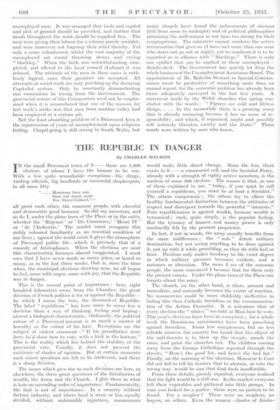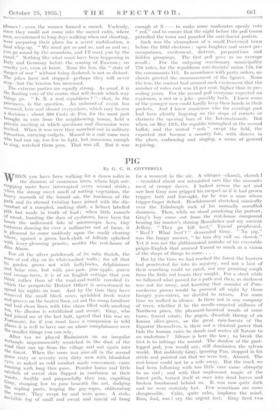THE REPUBLIC IN DANGER
By CHARLES MAURON
IN the small Provencal town of S— there are 1,900 electors, of whom I have the honour to be one. With a few quite remarkable exceptions—the clergy, visiting officials, big landlords or successful shopkeepers, in all some fifty St . 6 Messieurs bien mis Sane nut doute arms Dee Royer-Collard,"— all greet each other, the common people, with cheerful and democratic good humour. So did my ancestors, and so do I, under the plane trees of the Place or in the cafes, whether the Regence ' or ' Du Commerce,' Henri IV ' or ` de l'Industrie.' The reader must recognise this richly coloured familiarity as an essential condition of our lives ; against the world crisis it gives the atmosphere of Provencal public life—which is precisely that of a comedy of Aristophanes. When the elections are near this characteristic becomes almost exaggerated. I must own that I have never made so many jokes, or heard so many, as in the last three weeks, that is, since the time when, the municipal elections drawing near, we all began to feel, some with anger, some with joy, that the Republic was in danger.
This is the second point of importance : here, eight hundred kilometres away from the Chamber, the great division of French politics is for or against the Republic— by which I mean the true, the dreamed-of Republic. The label " republican ." has here come to cover less a doctrine than a way of thinking, feeling and hoping : almost a biological characteristic. Ordinarily', the political colour of a Provencal peasant is as much a matter of heredity as the colour of his hair. Exceptions are the subject of violent comment—" If his grandfather were here, he'd show how to vote, with a kick in the bottom." This is the reality which lies behind the stability of the provincial vote. Usually, it does not prevent the existence of shades of opinion. But at certain moments such minor questions are felt to be irrelevant, and there is a sharp division.
The issues which give rise to such divisions are here, as elsewhere, the three great questions of the distribution of wealth, the Army and the Church. I give them in what is here an ascending order of importance. Fundamentally, the first is not of importance. In a country without factory industry, and where land is more or less equally divided, without unbearable injustices, communism would make little direct change. None the less, there exists in S— a communist cell, and the Socialist Party, already with a strength of eighty active members, is the nucleus of some 500 electors.. The reason is that, as one of them- explained to me, " today, if you Nyant to eall yourself a republican, you must be at least a Socialist." The others compromise ; the others try to efface the healthy fundamental distinction between the attitudes of respect and disrespect towards the powerful " interests." Pure republicanism is against wealth, because wealth is tyrannical ; such, quite simply, is the popular feeling. But the tyranny of finance and money power is only confusedly felt by the peasant proprietor.
In fact, if not in words, the army usually benefits from the same indifference ; the " reds " detest military domination, but not seeing anything to be done against it, put up with it while grumbling, as they do with hail or frost. Pacifism only makes headway to the exact degree in which military pressure becomes evident, and a nuisance or obsession. The more I see of the common people, the more convinced I become that for them only the present counts. Under the plane trees of the Place one forgets about the army.
The church, on the other hand, is there, present and immediate, and naturally becomes the centre of reaction. No manoeuvres could be more childishly ineffective in hiding this than Catholic Socialism or the excommunica- tion of the Action Francaise. It is notorious that at every election the " whites " are told at Mass how to vote. This year's elections have been no exception ; for a whole week the Dominican missionaries have, been preaching against Socialism. From less conspicuous, but no less reliable sources, the country has heard that the object of the anti-fascists is to blow up the steeple, smash the cross, and paint the churches red. The children coming away from the Groupe Catholique repeated through the streets, " Here's the good list, and here's the bad list." Finally, on the morning bf the elections, Monsieur le Cure did not fail to tell his hearers that to abstain, or vote the wrong way, would be sins that God finds insufferable.
From these details, piously reported, everyone realised that the fight would be a stiff one. In the market everyone left their vegetables and gathered into little groups. In vain you looked for a porter---there were no porters to be found. For a weigher ? There were no • weighers, no buyers, no sellers. Even the women—shades of Aristo- ninnies !—even the women formed a crowd. Uselessly, since they could not come into the sacred cafés, where Men, accustomed to long days walking when out shooting, were preparing their plans for a secret mobilisation, a final whip up. " We must get so and so, and so and so ; you go round by the mountain, and I'll meet you by the Caney Nothing like what must have been happening in Italy and Germany before the coming of Fascism ;• no cruelty vet, even at heart. None the less, the " state of danger of war " without being declared, is not so distant. The jokes have not stopped—perhaps they will never stop—but the tension has increased.
The extreme parties are equally strong. As usual, it is the floating vote of the centre that will decide which way things go. " Is X a real republican ? "—that, in the Provinces, is the question. An unheard-of event has klecurred, here and almost everywhere, which may hasten a decision.: about 300 Croix de Feu, for the most part brought in cars from the neighbouring towns, held a private,meeting at which questions and discussion were Invited. When it was over they marched out in military formation, carrying cudgels. Massed in a café some men who had run up, too few to fight, but numerous enough to sing, watched them pass. That was all. But it was enough at S— to make some moderates openly vote " red," and to ensure that the night before the. poll teams patrolled the town and guarded the anti-fascist posters.
Such was the atmosphere of a small Provencal town before the 1935 elections : open laughter and secret pre- occupations, excitement, distrust, preparations and. hidden groupings. The first poll gave as an average result .: For the outgoing reactionary municipality 770 :votes, for the republican anti-fascists' union 710, for the communists 115. In accordance with party orders, no shouts greeted the announcement of the figures. None the less, the contest had aroused such excitement that the number of votes cast was 15 per cent. higher than in pre- ceding years. For the second poll everyone expected an explosion, a riot or a joke—possibly both. I knew some of the younger men could hardly keep their hands in their pockets. And I knew musicians who for evenings past had been silently fingering on the stops of comets or clarinets the opening bars of the Internationale. But when, on May 12th, the republic triumphed at the second ballot, and the united " reds " swept the field, the expected riot became a country fair, with dances in the place, embracing and singing, a scene of general rejoicing.



























































 Previous page
Previous page